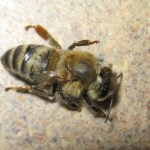Selfish Gene
Why does infection with bacteria or viruses make you feel sick? Prof. Guy Shakhar and Dr. Keren Shakhar have proposed that your symptoms are not just a byproduct of your body’s attempt to get rid of the infection. It is your genes’ way of ensuring they are passed down. The long and short of their argument is that the malaise, loss of appetite and lethargy are all ways of isolating you from your social group – so that your kin, who carry many of your genes, are not infected as well.
That means we share an evolutionary adaptation with such organisms as bees that go off to die far from the hive…
Nearly 50 years ago W. D. Hamilton published two papers, The genetical evolution of social behaviour - I & The genetical evolution of social behaviour - II, which helped revolutionize our conception of how social and genetic process might work in concert. It opened up a field of research which was highlighted in Richard Dawkins' The Selfish Gene, and helped make inclusive fitness a general idea which allows us to view specific phenomena through a powerful theoretical lens. Hamilton's original work was broad in its implications and abstract in method, but concretely utilized various…
A month ago Larry Moran made reference to Fern Elsdon Baker's new book, The Selfish Genius: How Richard Dawkins Rewrote Darwin's Legacy. Moran was a bit disappointed by the previews, his pet hobby-horse being the revolutionary impact of the neutral theory of molecular evolution, while Elsdon-Baker seems rather fixated on the potential of Neo-Lamarckism, especially epigenetics. Well, I've read the book, and Larry Moran would probably be disappointed, though she mentions Stephen Jay Gould and pluralism a bit, there's really very little engagement with the 20th century debates in evolutionary…
How genes for altruism can benefit strangers as well as kin
The generosity of adoption has long been considered a unique human hallmark.
Image: Shadows of Forgotten Ancestors
For decades it was conventional dogma that humans were the only species that used tools. "Man the Toolmaker" was our celebrated designation. The hominin fossil Homo habilis (or "handy" man) was even defined within our genera primarily because the skeleton was associated with stone implements. However, when Jane Goodall discovered chimpanzees using modified sticks at Gombe to "fish" for termites, Louis Leakey famously…
